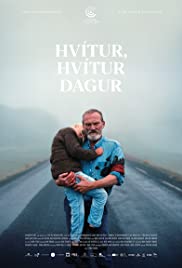
A WHITE, WHITE DAY
Iceland, 2019, 109 minutes, Colour.
Ingvar Sigurdsson, Ida Mekkin Hlynsdottir.
Directed by Hlnur Palmason.
Iceland has a Scandinavian heritage. It has the clouded atmosphere and temperatures of northern Europe. The landscapes are rugged, coastal and mountainous. And the population is small, something like an island nation village. The Icelandic film industry is not prone to comedy.
And this drama is certainly not comic. It is sombre, often grim, white, white days indicating snow but a quotation, Source Unknown, at the film’s opening, suggests that when the day is white, when sky and earth are indistinguishable, ghosts communicate with the living.
The initial focus is on a car driving on an icy road, a comparatively long sequence, and then the car skidding, crashing into the guardrail and disappearing. In fact, this episode will be highly significant as the drama unfolds.
Then the director uses a telling device, the fixed camera on a farm house which is being repaired, ponies on the property, mountains in the background – then a succession of still shots, the house in night and day, in different seasons, grounding our attention in this environment. We spend a lot of time in the interiors of the house, especially as it is being repaired and renovated, but also some time at the local police station, on the roads and in the tunnel under the mountains, in the countryside, and by the sea. We experience the Icelandic atmosphere.
Which is important because the central character, Ingimundur (a powerfully persuaded persuasive performance, often menacing, by Ingvar Sigurdsson), a local policeman, his renovating the house for his daughter and his granddaughter, Salka. We come to realise that he is grieving for his dead wife, killed in that car accident. He holds in his feelings, putting all his energies into the house. He does have some help in counselling but is resistant. Ultimately, reacting badly to the questions put to him (by Skype because of weather difficulties and travel), he erupts. And he takes it out on the local police, another violent eruption. And Salka, with whom he spends a lot of time, cheerfully bonding with her, but then she experiences the brunt of his outbursts.
A significant part of his grief is that he feels his wife had kept secrets from him. And the latter part of the film finds Ingimundur goaded into confrontation, quiet rage, and emotional collapse.
As might be expected, there is no neat or happy ending in this kind of Icelandic drama. Rather, Ingimundur has gone through grief, traumatic consequences, emotional collapse, but also steps towards apology, reconciliation, some possibility for peace in his soul and in his life.
1. An Icelandic story? Contemporary drama? The tradition of sombre Scandinavian storytelling? Situations, characters, interactions, potential for violence?
2. The title, the quote from the unknown source, ghosts speaking from the past on white days?
3. The opening mood, the car on the icy road, the audience observing, the sudden swerve, crash, disappearance? The significance of this accident for the rest of the drama?
4. The device of focusing on the house, the fixed camera, the ponies, cars arriving, day and night, the changing seasons? The mountain background? The significance of the house throughout the film? Repair, renovations?
5. Ingimunder and his story? Age, policeman, his daughter and care for her, renovating the house for her and her daughter, his dislike of her husband? The effort of working on the house, interiors, on the roof? His minding his granddaughter? Enjoying her company?
6. Salka, her age, lively, her relationship with her mother, with her father, with her grandfather, her presence in the house? Keeping her grandfather company? Driving with him?
7. Ingimunder at home, jogging, playing football, interactions with the other men? Friendships, talking, storytelling, the showers? His visit to the police station, family relationships, tensions? His later outburst against them, putting them in the cells after the fight? His attempt at an apology?
8. The gradual revelation of his suspicions of his wife? The psychologist, the questions, his answers, the interview via Skype, his outburst and destroying everything? The discussions with his friend, his friend’s infidelities? Ingimunder and his declaration of his suspicions?
9. Going to the house, confronting the man, driving into the countryside, with the rifle, the threats? The grave, their sitting on the sides? His forcing him into a confession? To describe the wife, her beauty, the sexual experiences? The man and his confession? Upset? Getting away?
10. The surprise of his accosting Ingimunder, Salka in the back after being upset with her grandfather and his outburst, the man and his knife, stabbing Ingimunder, Salka screaming? The car, going through the tunnel?
11. The consequences of this experience, going back to the house, apologising to Salka, the popular making peace with the police? The cathartic experience and his sitting in the house, calm? His future and some kind of peace?